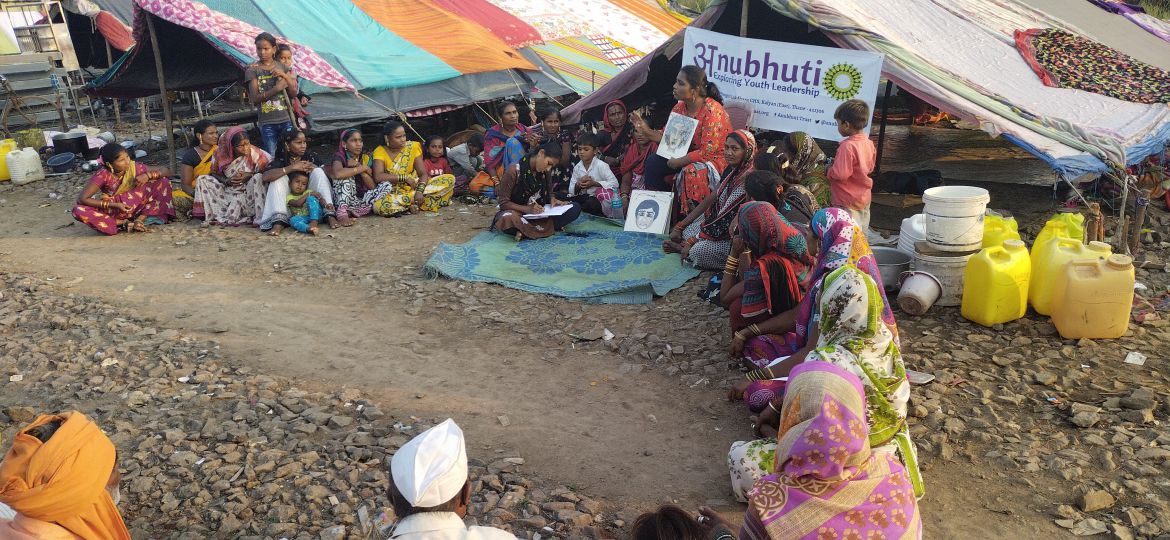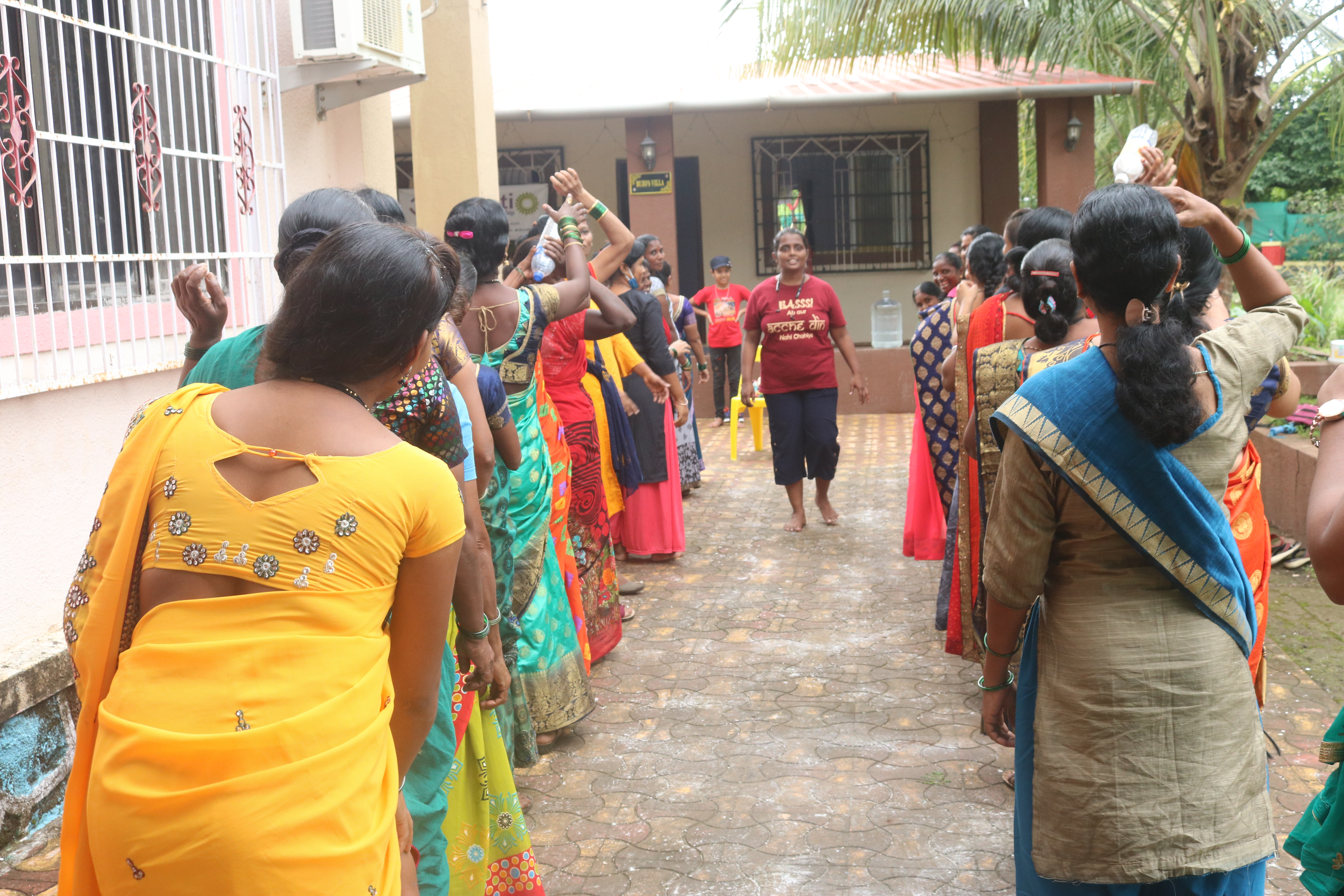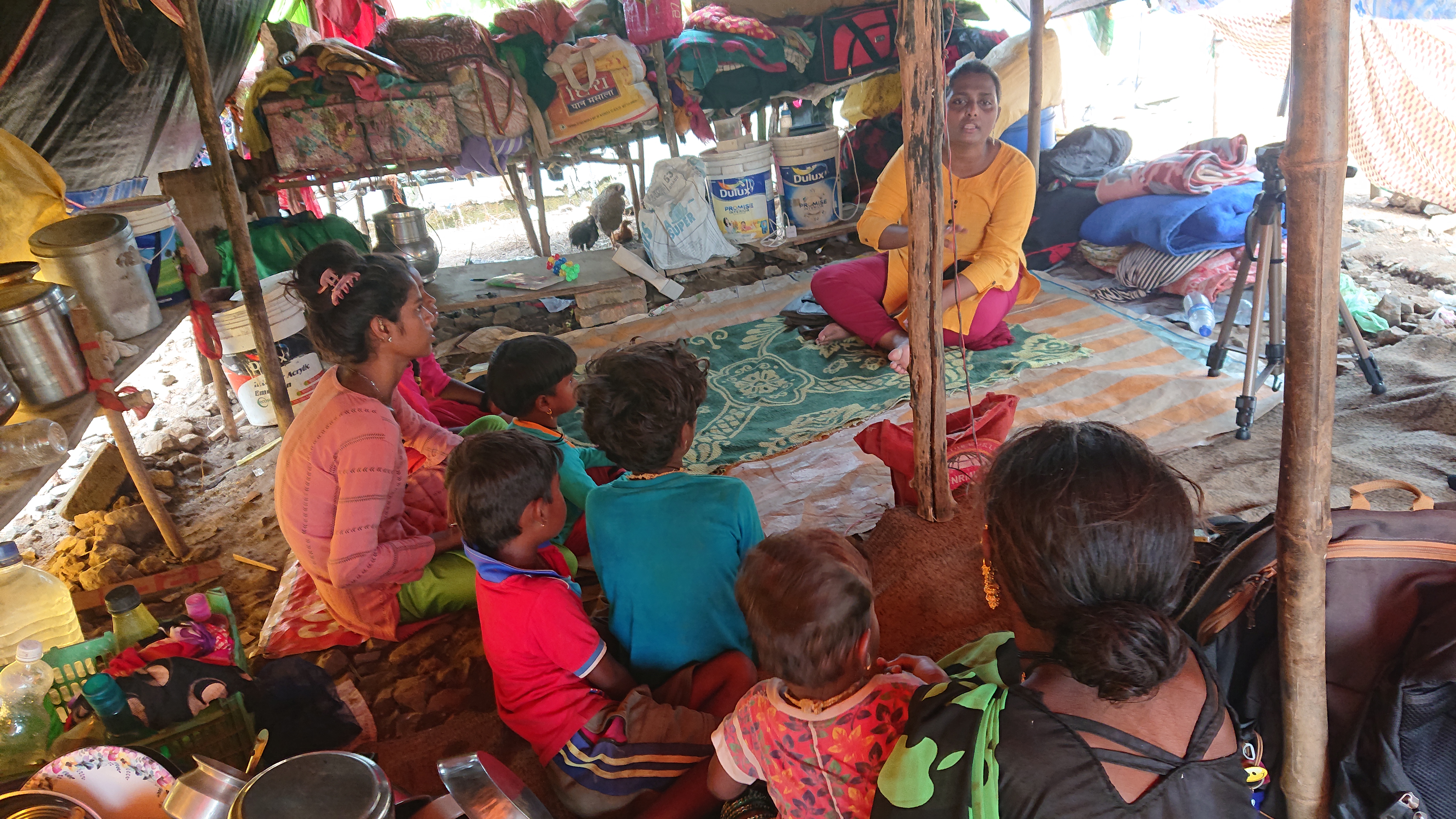
Deepa Pawar is the Managing Trustee & Founder Director of Anubhuti Trust, and is well-known for her work with NT-DNT (Nomadic and Denotified Tribes) communities. A member of the Ghisadi (Gadiya Lohar) community, she started working with girls and women at the age of 14. Since then, with over two decades of experience in the social sector, she has sought to address key issues of gender, health, rights, leadership, mentoring, community development, sanitation, and related subjects. Deepa has a Masters in Social Work and is a trained counsellor. She has worked extensively across the state of Maharashtra, with youth, women, communities, NGOs, colleges, and local and state governments. Deepa says, “If a community is suffering such severe challenges that are impacting them mentally over generations, over hundreds of years; if the ways of mentally exploiting them are so easy and accessible to all, this means that it is not they who are experiencing mental imbalance but society that is attacking their mental justice and stability.”
Shikha Aleya (SA): Deepa, thank you, we are happy to have you here to share your insights with us. We request you to tell us something of your growing up years with the Ghisadi (Gadiya Lohar) community. How have you observed the intersections of mental health and sexuality, of caste, class, and gender unfold around you?
Deepa Pawar (DP): Nomadic Tribe communities have their particular characteristics that are unlike even those of other marginalised communities. They are originally matriarchal, with easy acceptance of varied sexual and gender identities, and do not have castes. However, later Brahminical Patriarchal influences from society outside the community, have injected a lot of these discriminatory practices in these communities.
The magnitude of poverty, migration, unemployment, medical crises, knowledge gap, removal from the mainstream, and experience of struggle, is very high. While they are trying to survive and are searching for their development pathways despite everything, the severity of sexuality, caste, class and gender issues in their context is very serious. Mental attacks – that is, attacks that have direct mental impact – against nomadic communities are so generalised that society very easily accepts extreme violence, neglect, and discriminatory behaviour against them, which would otherwise be unacceptable in case of more privileged communities. In other words, violence against them – to the extent of inhuman treatment – is normalised. This is through formal and informal mental training of different institutions of society: to think nothing of and turn a neglectful eye to all kinds of visible, invisible, extreme, subtle, mob and structural violence. The severity of the impact of such societal neglect is that much more in the context of women, trans persons, children, and the more vulnerable within them.
Moreover, their languages are not understood by the mainstream. Instead of trying to learn, society blames them and puts them down for communicating differently, tries to change their language and targets them for not speaking in the mainstream language. This denial of recognition of something as fundamental as language, the inaccessibility of resources, discriminatory behaviour, and unconstitutional failure to provide facilities such as housing, access to healthcare and education, have a compounding impact on their collective mental health. Within them, sexual minorities, religious minorities, those working in highly unorganised jobs such as performing with their animals on roads or begging, those living in shelters or who are homeless, and those from many other intersectionalities – the levels of violence they face on a regular basis is unimaginable. Their fight over hundreds of years against this magnitude of visible as well as invisible, subtle and hidden violence, can be said to create a huge barrier to their mental wellbeing, confidence, social daring, participation, and relief, and to increase their mental pain and difficulties.
Due to their unjust criminalisation, they have a historical background of mental oppression, of physical and sexual exploitation, and of cultural appropriation, that is faced by entire communities across generations. There is hardly any accountability of the government, administration or of civil society for their housing, education, dignity, safety, health or rehabilitation.
SA: Please tell us more about the conceptual approach you have created, of Mental Justice. You have said, “To understand the need for mental justice, we need to delve into history to understand ‘mental injustice’. Any group oppression begins with mentally oppressing members into feeling weak; this is sustained over decades, and eventually normalizes discrimination and violence inflicted upon marginalized communities.” Reflecting on the queer community and minority stress using this lens, what are the immediate thoughts that come to your mind?
DP: Nomadic & DNT communities are originally much less patriarchal than the mainstream, settled communities. They are commonly used to different sexualities, gender identities, and queerness. Some of their occupations still manifest this diversity within them – such as the community of Muralis (women) think nothing of dancing and performing alongside Hijras (trans persons) in religious functions.
However today, Brahminical Patriarchal interjections from outside these communities have proved very powerful in influencing them away from their own natural ways. The superiority of the ideal of the Hindu upper caste masculinity that is upheld by mainstream society is not natural. However, the more that our political, social, and administrative thought is dismissive towards the natural – the more painfully it is felt by those who do not fit into the unnatural ideal.
It is very regressive, Manuvadi politics at play – when society refuses to accept someone or entire groups because they do not fit into some artificial ideal or list of norms – when they cannot access their right to justice, which is an inalienable right – because they are not recognised or accepted. The impact of this is in all sectors from education, health, development, social work, law, media, and so on – affecting the mental health of those who do not fit.
If a community is suffering such severe challenges that are impacting them mentally over generations, over hundreds of years; if the ways of mentally exploiting them are so easy and accessible to all, this means that it is not they who are experiencing mental imbalance but society that is attacking their mental justice and stability. It is important that society understands their mental health as part of mental justice, of Constitutional Rights, of Human Rights, of environmental justice, of sexual justice, of leadership, participation and social development with community agency, so as to reject such easy violations of their mental justice.
SA: Anubhuti programs have directly and indirectly impacted many people, over 150,000 people since 2016. While working with vulnerable communities on difficult issues, what are some of the personal responses and reactions that Anubhuti team members experience? Please share some good practices that help build robust emotional and psychosocial support within the organisation’s grassroots teams.
DP: At Anubhuti we don’t believe in mainstream definitions of merit. We strongly believe in skills derived from lived experiences. Therefore, we follow maximum Bahujan representation – not tokenist. Maximum members of our team, our Anti Discrimination Committee, volunteers and interns are from Bahujan identities. We don’t hire our team depending only on our work needs, but depending on a person’s skills derived from their realities, and more importantly based on their wish to be part of feminist and Constitutional movement-based work.
Most of the team as well as our youth and community leaders are organically developing Mental Justice leadership – with feminist, anti-caste, anti-fascist, and Constitutional stands.
Anubhuti is one of the first organisations to have an Anti Discrimination Policy that oversees all programs and processes to ensure that not only is there no discrimination based on caste, gender, sexuality, religion, language, disability and so on, but to ensure that every organisational effort and resource actively works to combat discrimination.
Organisational practices are not decided only by the organisation, but majorly with inputs of the team and the community. These are people who have not been seen as worthy of ‘being counted’, of being intellectual, of being experts. They suffer from historical guilt, of feelings of inferiority, and low social confidence – despite possessing a rich pool of skills, talents, knowledge and expertise derived from varied life experiences. At Anubhuti we make efforts to combat this historical guilt and feeling of inferiority by practices such as learning from the icons of Bahujan history – that is, from leaders of grassroot movements such as Savitribai Phule, Dr. Ambedkar, Periyar, Fatima, Kabir, and numerous other leaders who all emerged from the grassroots to lead great mass change towards progressiveness. Who took great risk to their lives, to their mental and physical health, but stood strong by their progressive ideologies.
As an NGO, we do not want to become indirect carriers of Brahminical Patriarchy ourselves, by serving ideologies and theories – even if progressive – that come exclusively from the privileged. This is because many a times, these theories are not connected to the realities of the Bahujan, that is, of the majority. The Bahujan, that is the grassroots, derive inspiration when they hear of their own leaders, movements and icons. They gain unmatched confidence when they realise that it has been their ancestors who have created and nurtured progressive ideologies since ancient times – such as in the Buddhist movement, Sufi movement, Bhakti movement, Satyashodhak movement and so on. It is in these histories where they learn best practices, and also critique any practices that led to failures in those times. They come to know of the far-reaching vision, of work that was sustained over thousands of years, of the diverse leadership, organising practices that gave birth to many fundamentals of democracy, of mental and emotional support to activists in the movement, of democratic communication and many other practices. This gives them the strength to combat the offensive and inferior view of themselves that they have been made to bear since childhood. Thus, it is our priority to create and bring into constant discussion narratives of community agency, progressiveness, and richness, instead of narratives seeing them only as passive and vulnerable, in need of help.
This involves a lot of fact finding, history study, documentation, community led data advocacy, creation of content and publications – because there is not much literature in the first place of these histories.
We also place a lot of importance on basic needs that is food, shelter, education, health and dignity – that directly impact one’s mental health – and which are constantly threatened in context of the grassroots. Fundraising and resources-building is constantly being done to provide support to the team, youth and community leaders in this context – along with counselling, capacity building and training.
SA: Thank you. These are critical reflections that challenge some commonly held assumptions. Based on Anubhuti’s experience with Covid-19 relief work, what is the socio-political response required to address the sexuality and mental health issues of marginalised communities today?
DP: In our observation and as per many studies around the world during disasters, including during the COVID period, the powerful during emergencies become more powerful, and the marginalised become weaker. In such a reality, it is the ethical responsibility of political and social decision-makers to make sure that the painstaking work put in by generations of marginalised communities for their development is not lost. It is their responsibility that if they cannot support, to at least not add to their problems by attacking them mentally, and at least be accountable for their justice.
Laws and policies of education (eg. scholarships), labour rights, the POSH Act, reservations, etc. should increase their Constitutional strength and viability to be accessible to such diverse groups as sexual minorities, NTs, sex workers and other highly informal working communities.
The media should get strong notification to stop creating offensive and false narratives about these communities which increase their criminalisation. The media should make efforts to instead support these communities’ efforts by showcasing their positive narratives, their struggles, their successes and their problems, with the objective of solving these problems.
The police should, instead of further criminalising very vulnerable communities, take the initiative to protect them. While promptly taking down their complaints might be an ideal that is not so easily achieved, the police can at least be expected to listen to them, to respond to them as humans, and to keep an eye out for them – not to criminalise them but to make sure that they are okay.
Political representation from these communities being so low, till we are able to increase this, rights-based movements can reach them with an intersectional approach. For example, the wellbeing of sexual minorities or of nomadic populations cannot be a separate issue taken up only by activists of these communities; it has to be an inherent issue taken up by all movements including the Mental Health movement. This has to be with representation of sexual minorities within these movements.
The historical injuries suffered by marginalised communities during COVID will continue to impact their generations to come; a strong socio-political response of Constitutional accountability is required.
SA: As you have highlighted, “marginalised communities – especially the women in them – have already developed community knowledge on coping with mental health, and there is value in learning from these strategies.” Looking ahead at recovery and re-building lives, how do we, as a society with diverse realities, build safety and inclusion? Where does one begin?
DP: We have seen that the community is very open to discussion. They are often seen fighting, arguing, discussing openly among themselves. This may be seen negatively from a mainstream lens. But if seen from the Bahujan lens, this can be seen as a sign of being open to frankness, communication, expression, taking and giving feedback, taking a stand, discussion, critique, opposition, recommendations and so on. We can certainly learn a lot from these in-built community practices. It is the same with their internal systems of support, where they easily ask and give help including monetary help; it is these internal support systems that keep them alive through severe emergencies with almost no resources. They do this without awkwardness or shame – which is a big strength. Similarly, there is no awkwardness or shame in sharing their pain, weakness, or struggles; weakness or vulnerability is not so closely connected with self-image or reputation. Which means that they are constantly and openly discussing their problems, getting a lot and different kinds of feedback, solutions and support – all of which is quite healthy from a mental health perspective.
Their skills of planning, communication, delegation, strategising, networking, resource-raising, skills of working with almost no resources, recovery, and intersectional approach – in all of which women are in leading roles without being too aware about it were especially visible during the COVID emergency. It is these community practices which ensured their survival with no outside support. Most importantly, we can learn from their anti-caste, democratic, anti-capitalist approaches – that we observed especially among NT communities during our relief work. For example, every NT community leader was constantly connecting us to others around them irrespective of their identity, appealing to us to help these other groups too. Instead of hoarding or stocking up on ration among the NTs, if there was any surplus, they would immediately start planning on how to send any extra ration to someone around them in need.
Another practice that we may learn from is the regularity with which nomadic and other marginalised communities follow-up with the administration and other stakeholders for solving their problems. This kind of active follow-up is very important from the point of view of mental health recovery.
Finally, we can learn from them to give suggestions or make interventions after studying each culture, language, reality, history, the strengths, weaknesses and beliefs, instead of using a ‘one glove fits all’ approach. To understand that there are many diversities within communities. To not do this is as dangerous as giving the same medicine to everyone without studying each person’s symptoms and underlying conditions.
Image Credits: Courtesy of Deepa Pawar


